I fell into arts journalism as a fluke, more than anything. I knew I wanted to write for the Chronicle coming into college, but I didn’t know which section I wanted to write for—or even, honestly, that there were different sections. And I certainly didn’t know that you could devote an entire section to a hodgepodge of music and film reviews, artist profiles and the most recent cultural happenings on and off campus.
At my first few Recess meetings, I was struck by just how interesting and knowledgeable all of the upperclassmen were: They all had evolved opinions on albums and movies I’d never heard of, or were writing senior theses, or knew exactly how to structure a campus arts piece or a review. But more than that, I was struck by how much they cared about the work they did, and how committed they were to sharing their knowledge with others, be it through writing articles themselves or mentoring freshmen like me. This level of commitment to something entirely non-academic hooked me, and made me realize I could be a part of something truly special.
What made me stick with Recess, and eventually lead it, was the sense of wonder I got out of listening to sources talk about their art, and what drove them to make it. Looking back over four years, my favorite interviews haven’t been with the most impressive people, but with those who were so excited about what they were talking about that they couldn’t stop smiling, and I couldn’t stop smiling either. The entrepreneurs, filmmakers and photographers I’ve been able to interview have been some of the most infectiously enthusiastic people I’ve met. After all, no one goes into the arts for the money—you have to do it for love.
Duke can be scary and overwhelming at times, and being able to set aside a few hours each week to talk to artists, thinkers and dreamers made me see time and time again that Duke isn’t such a bad place after all. Interviewing so many people who were following their passions let me follow mine, right down a journalism path.
Unlike news and sports, plenty of Recess stories aren’t begging to be written. We choose to write them, to dive into the impact of Durham theater closing, a new program supporting local community artists, a campus play bringing Ukrainian theater to Duke. We aren’t really holding the university accountable, but rather shining a light on what make Duke and Durham interesting. Separately, they all seem a little eccentric, but together, they’re a mosaic of the arts and the incredible people working to bring them to life.
Of course, not all art is created equal. Looking through some old notes I took during an “arts criticism” Recess training session freshman year, I stumbled across a quote I wrote down: “Sometimes art sucks, and someone needs to say so.” It’s true—where you can find art, you can usually find criticism of it. But, as some of our esteemed editors pointed out a few months ago, isn’t taking the time to criticize something, to weigh its merits against its shortcomings, a form of love for the greater art form? I am constantly in awe of my fellow writers’ abilities to comb through an album or film and delve into its true meaning, or the mechanics that hold it all together, and come out with a balanced opinion of its value in a greater context.
And criticism doesn’t only apply to artists who will, in all likelihood, never open up a student newspaper in North Carolina. It applies to the institutions that hold Duke together, which need to be held to the highest standard. It isn’t enough to build another giant glass box to house arts programs; that box needs to be supplemented with resources and funding to support student artists and the local community. But, for the sake of fairness, it’s a start, and I’m excited to see how Duke’s arts scene develops long after I’ve left.
Any print issue of the Chronicle will include criticisms of Duke, as well as highlights of accomplishments of Duke students and faculty—and both are well deserved. But looking around 301 Flowers on any given Tuesday production night, seeing other staffers edit article after article and cobble together layout and accompanying graphics and images, it all just feels like a labor of love.
Christy Kuesel is a Trinity senior, English major and Recess editor for Chronicle v. 114. She’ll save most of her teary goodbyes for her final Recess editor’s note, but she’d like to thank her fellow section heads and everyone who helped make this volume her favorite yet. After graduation, she’ll be soul searching, couch surfing and job hunting — hopefully finding something in media!
Get The Chronicle straight to your inbox
Signup for our weekly newsletter. Cancel at any time.

